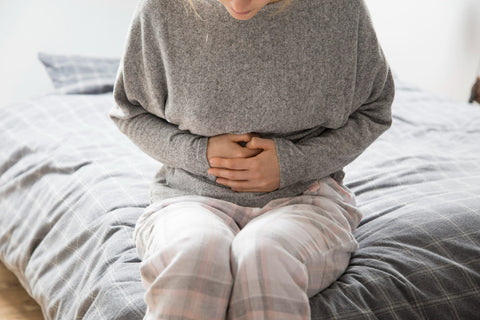Take a good quality Probiotic formula such as UltraProbio, ColiProbio or DailyProbio as gut health greatly depends on a healthy ratio between good and bad bacteria. In 2017 scientists studied adults with IBS and anxiety. Half of the group took a probiotic (Bifidobacterium longum) and the other was given a placebo. It was found that twice as many patients experienced improvements when they took a probiotic (1,2,3,4,5).
- Probiotics have beneficial effects on IBS, which can improve the patients' symptoms and with less adverse reaction (1).
- Probiotic therapy has significant benefits in the treatment of irritable bowel syndrome (2).
- A probiotic mixture is effective in alleviating irritable bowel syndrome symptoms (3).
- A symbiotic formulation containing Lactobacillus paracasei has a therapeutic effect in patients with diarrhoea-predominant IBS (4).
- Bacillus coagulans significantly improves abdominal pain and bloating in patients with IBS (5).
Use activated Charcoal (especially in case of diarrhoea) to detoxify colon and reduce inflammation.
Charcoal tablets have therapeutic value in the treatment of patients with irritable bowel syndrome (6).
- Magnesium citrate, or another well absorbed form of magnesium such as bisglycinate, is regarded as one of the most beneficial nutritional supplements for people with spastic colon or IBS (irritable bowel syndrome) as it relaxes nervous system and muscles including colon. Magnesium citrate can be very beneficial for those suffering from constipation as being a water-hungry molecule it draws more water into colon. According to Dr Craig Maxwell „Magnesium helps to relax the smooth muscles of the colon allowing normal bowel movements. While a diet high in fibre is important, magnesium is even more important… In a study published in 1996 researchers explain that magnesium sulphate pulls water from other tissue into the small intestines. This water stimulates the muscular movement of the intestines, helping with bowel elimination. The American Cancer Society, state that magnesium citrate has the same laxative effect and usually results in a bowel movement within ½ to 3 hours from taking a supplement.” However, in some people, especially those with inflamed and sensitive colon, too much magnesium citrate may lead to lose stools. In this case, start from small doses such as 50 mg two times a day and gradually increase the dose or instead of citrate take magnesium bisglycinate which doesn’t impose the laxative effect at all.
- Also, Aloe vera appears to be very beneficial to the lining of the colon: Aloe vera may have therapeutic value in the treatment of irritable bowel syndrome (7).
- Take Vitamin D3 supplements as deficiency of this vitamin has been linked to all autoimmune conditions including ulcerative colitis and Crohn’s disease. Deficiency of vitamin D is also highly prevalent in people with IBS and IBD. While using vitamin D3 supplements always remember to take well absorbed magnesium (such as citrate or bisglycinate) as vitamin D requires magnesium for its conversion and leads to magnesium deficiency over time. Taking vitamin D you need also vitamin K2 MK-7 (derived from natural Natto) to prevent vitamin D from leading to calcification.
Vitamin D deficiency is highly prevalent in patients with IBS and these results seem to have therapeutic implications (8).
- Take a good quality Multivitamin-Mineral formula such as Day-vit Probio (combination of vitamins, minerals and probiotics) or Healthy Mega which contains over 20 vitamins and minerals and is fortified with 19 additional ingredients including herbs, alfalfa powder, rutin, citrus bioflavonoids, bromelain, digestive enzymes and many other super nutrients.
- Psyllium husk fibre can be very effective in promoting gastrointestinal health: Psyllium husk fiber reduced the number of abdominal pain episodes in children with IBS (9).
- Boost Glutathione levels as it is the most powerful of all antioxidants and strengthens the immune system. It is also important to provide body with the following ingredients that increase glutathione production in the liver: turmeric, milk thistle, L- cysteine, alpha lipoic acid, and vitamin C.
- 5-HTP (Tryptophan): According to Dr Maxwell „Patients with IBS should take 300-400mg of 5-hydroxytryptophan (5HTP) a day with food to boost serotonin levels. In most patients, symptoms improve to such point that within a few weeks we can focus on more important topics, like who is going to win American Idol?” (10).
- Selenium (50-200mcg daily) and Zinc (zinc citrate is recommended as it doesn’t cause nausea): 10 to 20 mg a day after breakfast. Deficiency of zinc and selenium has been linked to various autoimmune conditions including inflammatory bowel disease.
- L-glutamine powder (5 grams 2 x daily with meals) Glutamine is an amino acid that helps repair the digestive tract, especially important for people with chronic diarrhoea.
- Quercetin has been shown to improve gut barrier function by sealing the gut. It also reduces the release of histamine and inflammation. New studies have also demonstrated its effectiveness in treating ulcerative colitis (11).

Nutritional And Lifestyle Recommendations
- Eat plenty of raw vegetables salads and raw vegetable juices.
- Eat whole, unprocessed foods, and choose as many organics as possible.
- Increase intake of healthy fats such as raw coconut oil, coconut milk, avocado, chia seeds (soaked for at least 30 minutes or overnight), ground flaxseeds, and hemp seeds as they will help reduce gut inflammation and balance hormones. Coconut oil is very stable (shelf life of three to five years at room temperature), so body is much less burdened with oxidative stress than it is from many other vegetable oils.
- You need more fibre but increase it gradually. Start from vegetable juices as they are deprived of fibre and will heal colon. You can try steamed and cooked vegetables and slowly add more raw vegetables.
- Drink 2-3 glasses of soft water 3 times a day between meals.
- Avoid refined sugar, high glucose / high fructose syrup Splenda, aspartame, and other artificial sweeteners. Use raw organic honey, xylitol or stevia instead.
- Avoid gluten (wheat products, etc.) as it may cause the immune system to start sending antibodies not only against gluten proteins but also against proteins found in different organs causing autoimmune diseases such as IBD that usually follows IBS. Many people with autoimmune diseases have an autoimmune reaction to gluten, and it usually goes unrecognized. Gluten can cause gastrointestinal system to malfunction, so foods aren’t completely digested. These food particles can then be absorbed into bloodstream where body misidentifies them as antigens and then produces antibodies against them.
- Avoid or significantly reduce consumption of dairy products as heated dairy protein (especially A1 casein) often irritates the immune system stimulating it to produce antibodies against different internal organs including colon. The most common allergies and food intolerances today are from wheat and dairy products because of the hybridized proteins of gluten and a1 casein. These proteins can contribute to Leaky Gut Syndrome and inflammation.
- Eliminate or reduce stimulants (alcohol, smoking, anything with caffeine or other similar harmful alkaloids: coffee, tea, green tea, mate, yerba mate, cola, chocolate, etc.)
- Eliminate all junk food, processed food, trans fats, refined pro-inflammatory plant oils and margarines, and anything with harmful preservatives and chemicals.
Related Articles
- Probiotics for Lactose Intolerance
- Lactose Intolerance Support
- The Healing Power of Aloe Vera
- Activated Charcoal Should Be Found In Every Household
- How to Relive Constipation
References
- [A meta-analysis of probiotics for the treatment of irritable bowel (greenmedinfo.com)
- Probiotics in the treatment of irritable bowel syndrome. | GreenMedInfo
- A probiotic mixture alleviates symptoms in irritable bowel syndrome (greenmedinfo.com)
- Clinical trial on the efficacy of a new symbiotic formulation (greenmedinfo.com)
- Bacillus coagulans significantly improved abdominal pain and bloating (greenmedinfo.com)
- Charcoal tablets in the treatment of patients with irritable bowel (greenmedinfo.com)
- Randomised double-blind placebo-controlled trial of aloe vera for (greenmedinfo.com)
- Vitamin D Deficiency in Patients with Irritable Bowel Syndrome: Does (greenmedinfo.com)
- Psyllium Fiber Reduces Abdominal Pain in Children With Irritable (greenmedinfo.com)
- The Real Causes of Irritable Bowel Syndrome | Ask Dr. Maxwell (askdrmaxwell.com)
- Efficacy of quercetin derivatives in prevention of ulcerative colitis in rats - PMC (nih.gov)
Sources
- Hafström I, Ringertz B, Spångberg A, et al. A vegan diet free of gluten improves the signs and symptoms of rheumatoid arthritis: the effects on arthritis correlate with a reduction in antibodies to food antigens. Rheumatology (Oxford) 2001, 40:1175-1179.
- Proudman SM, James MJ, Spargo LD, et al. Fish oil in recent onset rheumatoid arthritis: a randomised, double-blind controlled trial within algorithm-based drug use. Ann Rheum Dis 2013.
- Tursi A, Brandimarte G, Papa A, et al. Treatment of relapsing mild-to-moderate ulcerative colitis with the probiotic VSL#3 as adjunctive toa standard pharmaceutical treatment: a double-blind, randomized, placebo-controlled study. Am J Gastroenterol 2010, 105:2218-2227.
- Humbert, P.; Bidet, A.; Treffel, P.; Drobacheff, C.; Agache, P. (1991). “Intestinal permeability in patients with psoriasis”. Journal of dermatological science 2 (4): 324–326.
- Kiefer D, Ali-Akbarian L (2004). “A brief evidence-based review of two gastrointestinal illnesses: irritable bowel and leaky gut syndromes”. Alternative Therapy Health Medicine 10 (3): 22–30.
- Pike, M. G.; Heddle, R. J.; Boulton, P.; Turner, M. W.; Atherton, D. J. (1986). “Increased Intestinal Permeability in Atopic Eczema”. Journal of Investigative Dermatology 86 (2): 101–104.
- Z Liu, N Li, J Neu (2005) ‘Tight junctions, leaky intestines, and pediatric diseases’, ActaPaediatrica , 94(4), pp. 386-393.
- Vaarala O, Atkinson MA, Neu J (2008) ‘The “Perfect Storm” for Type 1 Diabetes The Complex Interplay Between Intestinal Microbiota, Gut Permeability, and Mucosal Immunity’, Diabetes Journal, (57)10(2555-2562).
- Maes M, Leunis JC (2008) ‘Normalization of leaky gut in chronic fatigue syndrome (CFS) is accompanied by a clinical improvement: effects of age, duration of illness and the translocation of LPS from gram-negative bacteria’, Journal of Neuro Endocrinology, 29(6), pp. 902-10.
- Visser, J (2010) Tight Junctions, IntestinalPermiability and Autoimmunity Celiac Disease and Type 1 Diabetes Paradigms. PubMed.
- https://www.ncbi.nlm.nih.gov/pmc/articles/PMC3795315/
- https://draxe.com/4-steps-to-heal-leaky-gut-and-autoimmune-disease/
- Image by katemangostar on Freepik
Any information or product suggested on this website is not intended to diagnose, treat, cure or prevent any medical condition. Never disregard medical advice or delay in seeking it because of something you have read on this website. Consult your primary healthcare physician before using any supplements or making any changes to your regime.





